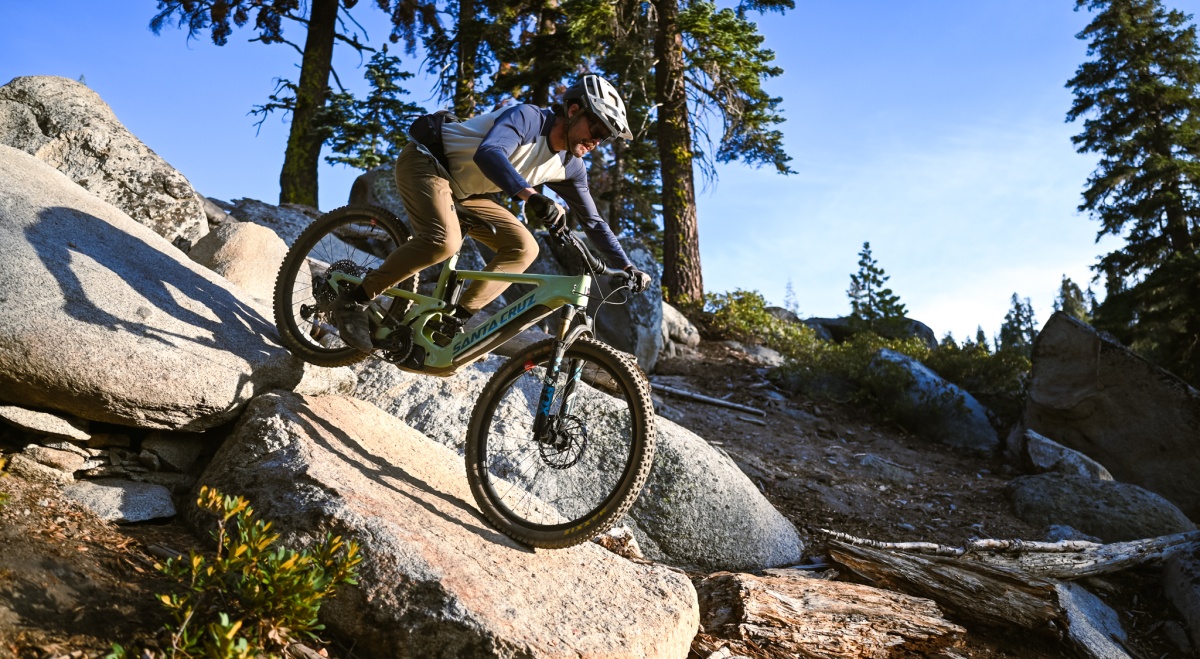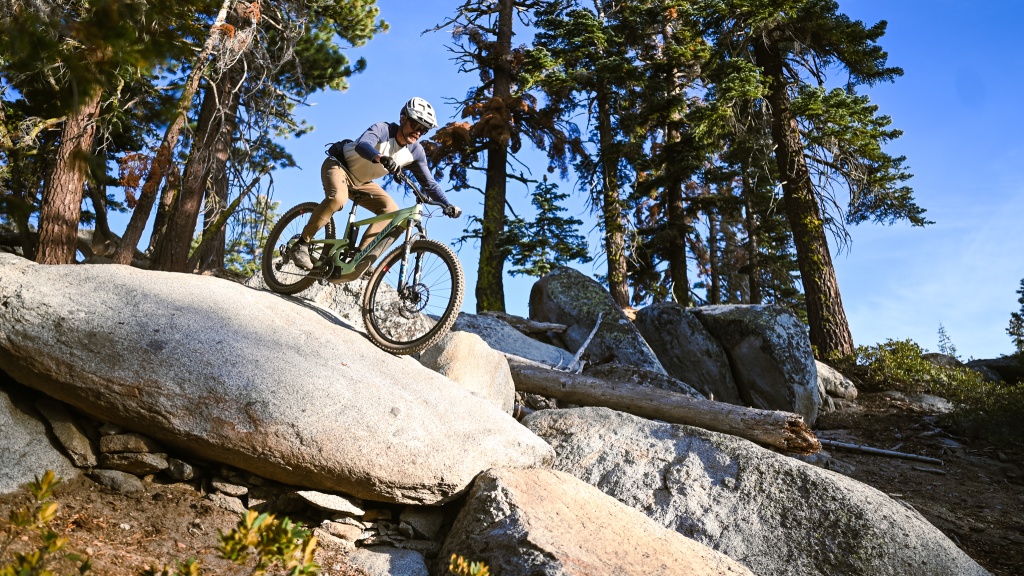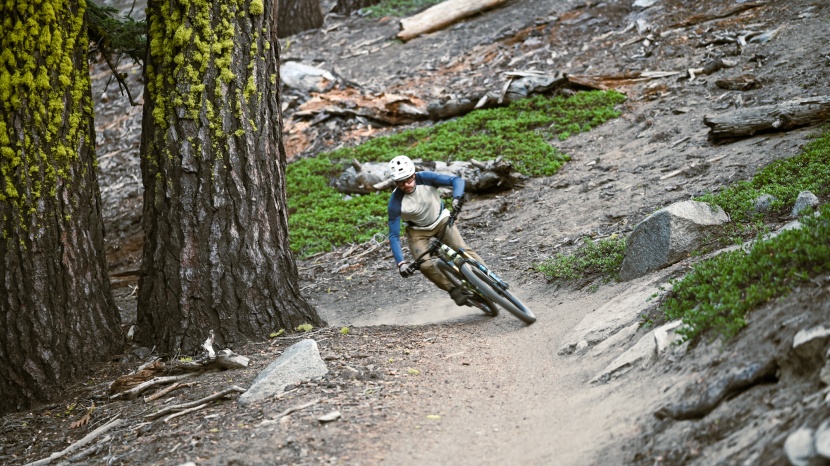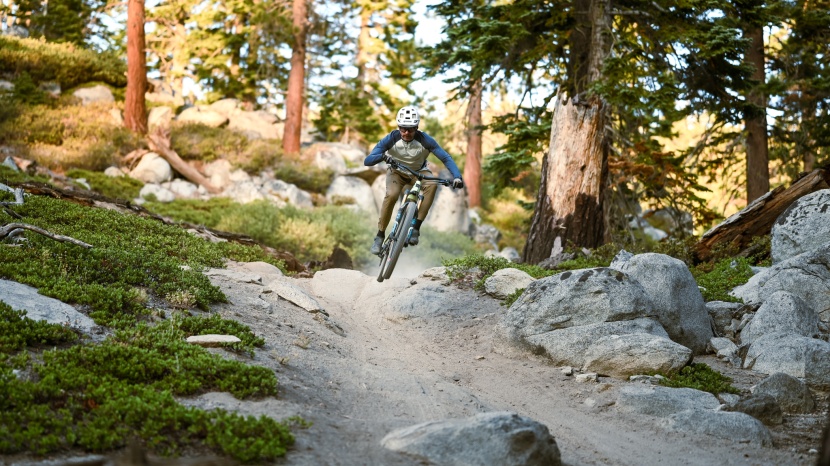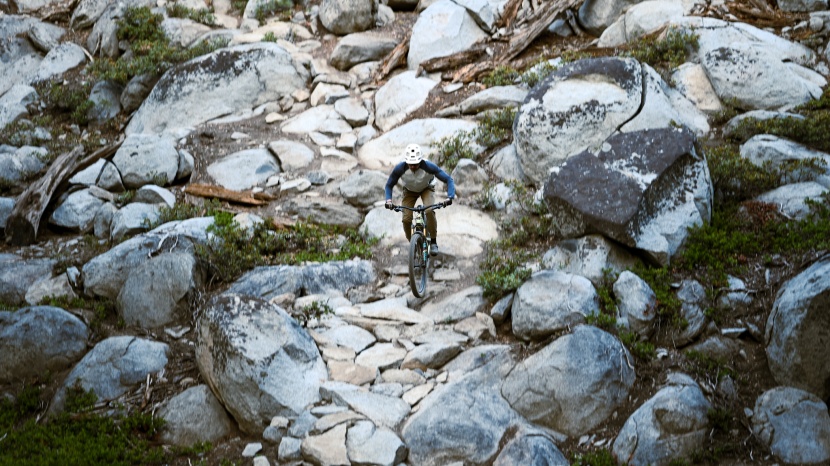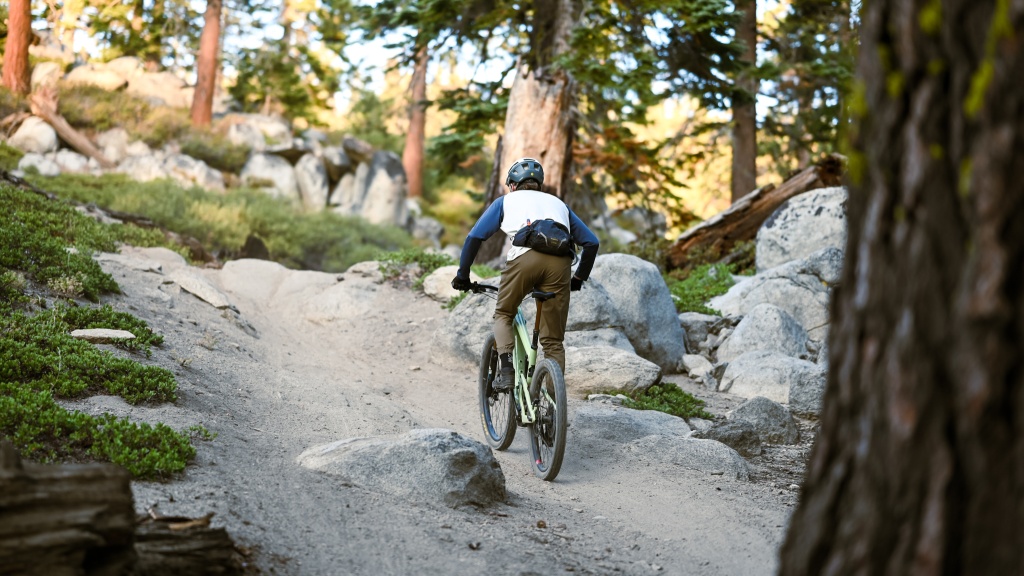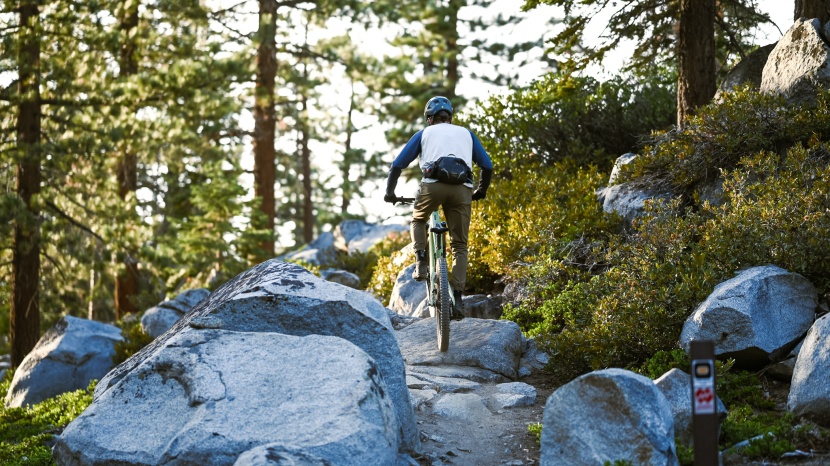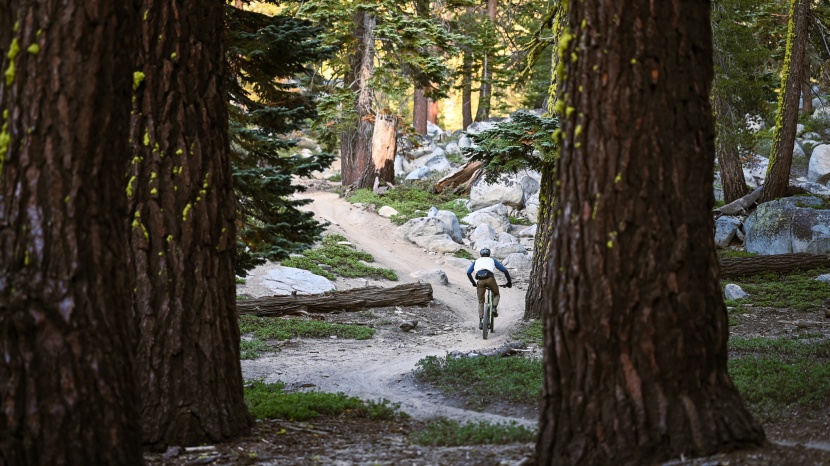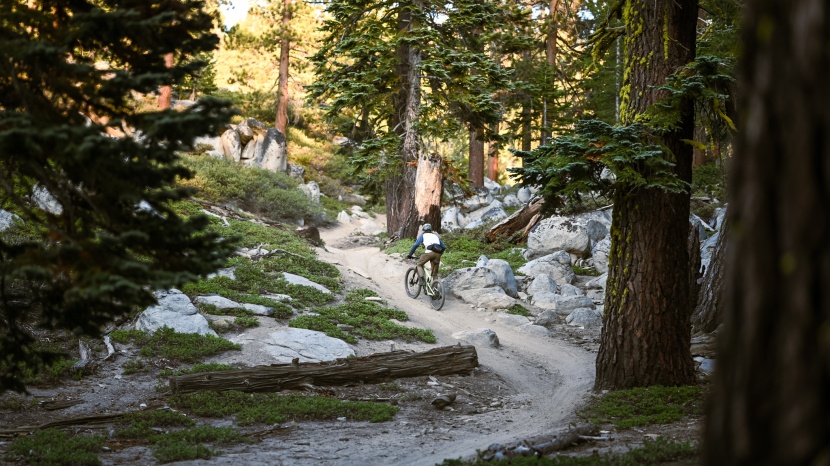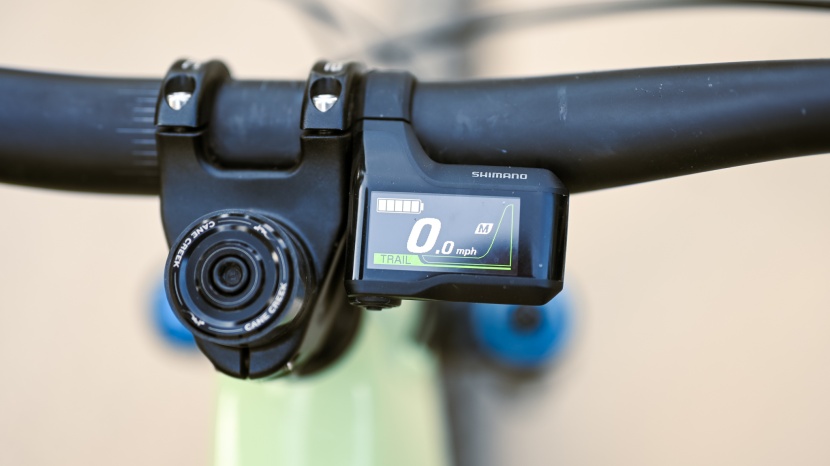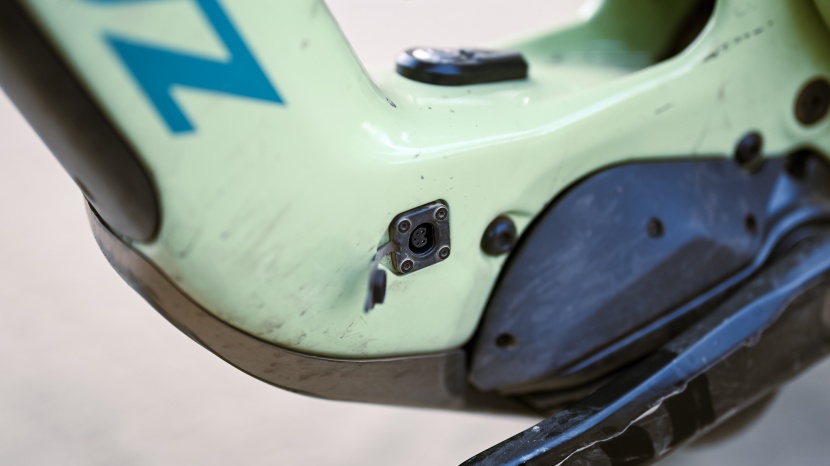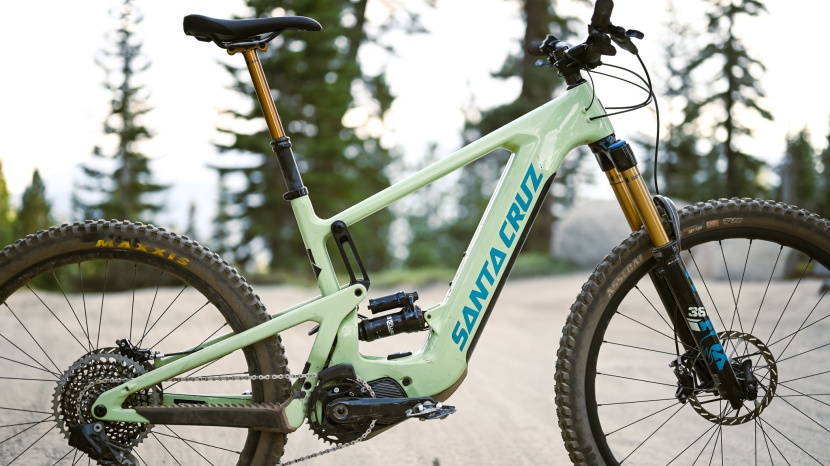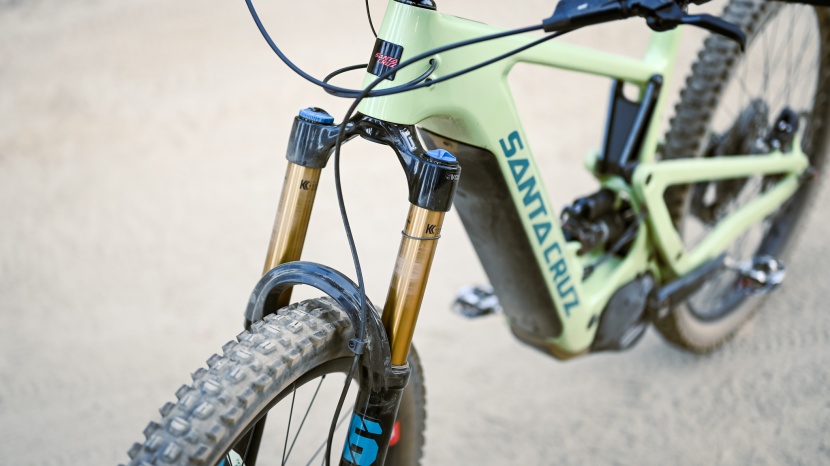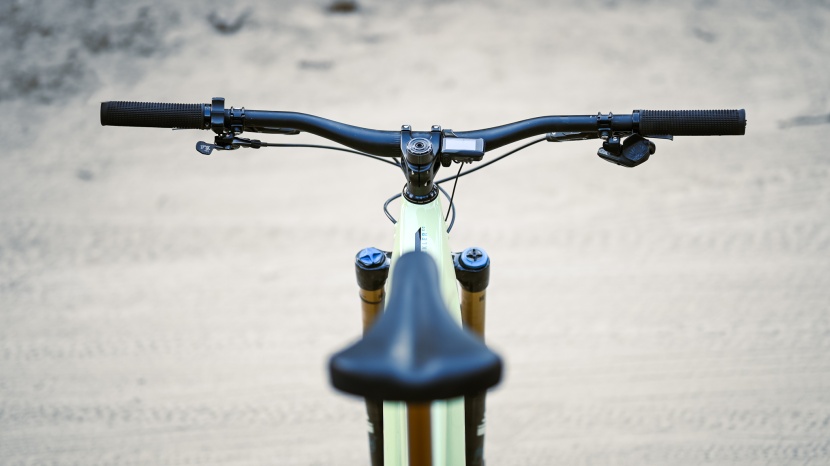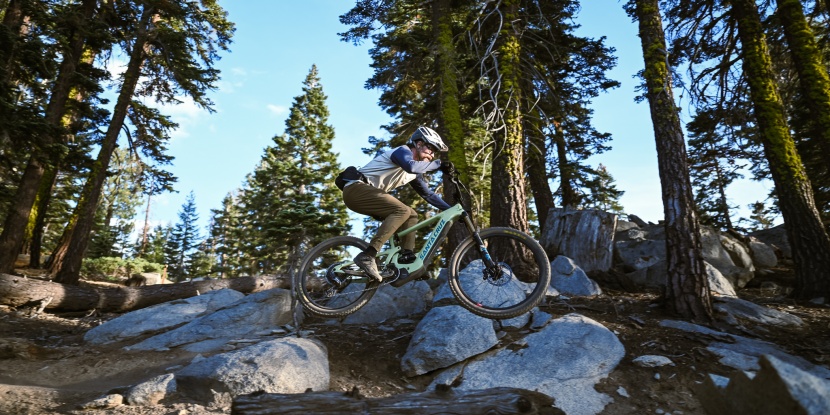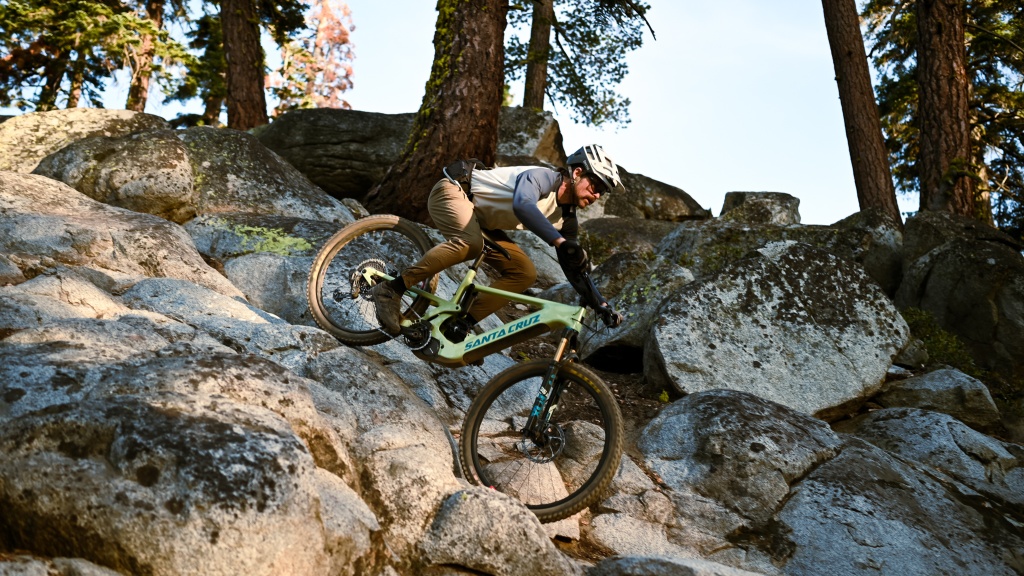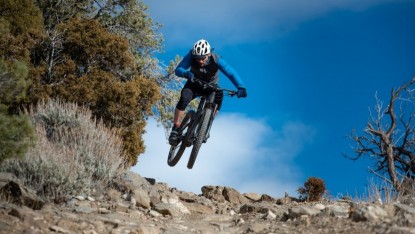Our Verdict
Our Analysis and Test Results
Santa Cruz is one of the biggest brands in mountain biking, so it came as no surprise when they joined the electric mountain bike market a few years ago with the first version of the Heckler. For the 2022 model year, Santa Cruz updated the Heckler in several notable ways including a revised geometry, a move to MX wheels (29-inch front and 27.5-inch rear), and a larger 720 Wh battery. While its geometry isn't 100% identical, it is essentially an electrified version of the popular Santa Cruz Bronson. With 150mm of VPP rear suspension paired with a 160mm fork and modern trail riding geometry, the Heckler MX slots squarely into the do-it-all e-MTB category. Read on for our impressions of this high-end electric mountain bike.
Downhill Performance
The Heckler MX impressed our testers on the descents. It has enough travel to handle just about anything you're willing to ride down and its versatile geometry feels at home on a terrain ranging from mellow to fairly aggressive. Whether cruising some flow, negotiating technical sections, or blasting full speed down rough trails, the Heckler ate it up, a testament to its all-around trail riding intentions. The quality components of the top-of-the-line spec certainly don't hurt its downhill performance either.
Mountain bike geometry has changed significantly in recent years, and modern trail bikes now sport numbers previously only found on downhill bikes. The Heckler MX has a geometry nearly identical to that of the latest version of the Bronson, in line with similar bikes made for aggressive trail riding. With a 64.5-degree head tube angle (low setting) a 475mm reach, and a 1,253mm wheelbase, it should come as no surprise that this bike feels confidence-inspiring and stable at speed or when pointed down steep terrain. Still, Santa Cruz has managed to keep it feeling fairly maneuverable with moderate length 446mm chainstays and the 27.5-inch wheel in the back. They do sell this bike with 29-inch wheels front and rear, but the mixed-wheel configurations are becoming increasingly popular on e-bikes for the snappier handling they allow. Such is the case with the Heckler. Considering its weight and length, it doesn't feel like a tank at lower speeds or in tighter terrain. It doesn't handle exactly like a regular trail bike, but it feels quite natural. Some of this can also be attributed to well-balanced weight distribution. Additionally, a flip chip in the lower shock mount can be used to make very minor changes to the geometry, 0.3-degrees at the head tube, and the suspension kinematics.
With 150mm of rear travel paired with a 160mm fork, the Heckler is ready for just about anything. This travel bracket seems like the sweet spot where it can handle virtually any terrain without being overkill for many riders. If that doesn't sound like enough for you, keep in mind that Santa Cruz also makes the longer travel Bullit. The rear travel is controlled by Santa Cruz's low-mount VPP suspension design. We appreciate VPP for its support in the mid-stroke and its very impressive performance on bigger hits and g-outs. Few designs handle big hits with the composure of VPP, in our opinion. The tradeoff, we have found, is that it isn't quite as calm over high-frequency chop and successive mid-sized hits as some other systems. That is not to say it doesn't work well, but some other bikes feel a little more supple. Regardless, the stout links keep the bike laterally stiff, and when combined with the Carbon CC frame and oversized junction at the head tube, it is very responsive to rider input and tracks nicely. Like other e-bikes, the weight is a contributing factor in its stability, as well as its impressive cornering abilities.
As the top-end build, Santa Cruz equipped the Heckler MX with an impressive parts package. The RockShox Super Deluxe Ultimate shock and Fox Factory 36 fork are excellent suspension components that do their jobs well. Still, we wouldn't be disappointed if this bike came with a Fox 38, just sayin'. The cockpit is totally dialed and provides excellent steering leverage and a high level of comfort. Code RSC brakes and the new HS2 rotors provide speed control. The Reserve Carbon wheels are tough while providing a great combination of stiffness and vibration dampening, and we'll never complain about the cornering or braking traction of the Maxxis Assegai/Minion DHR II tire combo. A tougher casing on the rear tire, however, would be greatly appreciated.
Climbing Performance
As an electric mountain bike, much of the Heckler's climbing performance can be attributed to the power delivered by the Shimano EP8 drive unit, but that's not the whole story. The VPP suspension design provides a nice supportive pedaling platform, and the geometry helps to keep it quite maneuverable and comfortable. Whether blasting up a fire road or twisty technical singletrack, the Heckler has got your back.
The geometry of the Heckler has been well thought out to perform on the descents and on the climbs. The 76.4-degree seat tube angle (low setting) isn't the steepest, but it's plenty steep to position the rider nicely above the bottom bracket for direct power transfer down onto the pedals and in an up top position that works well when tackling steep sections or tricky technical uphills. It also keeps the 475mm reach measurement (size Large) feeling comfortably neutral and avoids being too stretched out. We found the body position to feel fairly relaxed while climbing, thanks in large part to the delightful Santa Cruz Carbon Riser handlebar. Still, uphill handling feels very responsive. The 1,253mm wheelbase is fairly long, and the Heckler feels great with some momentum when powering up and over obstacles in the trail, yet it remains more maneuverable than you might expect, given its length. You'll notice it in sharp switchbacks, but the smaller rear wheel, moderate-length chainstays, and balanced weight keep it feeling spryer than we expected. One thing worth noting is that even with the short 165mm crank length, the bottom bracket is fairly low at sag, and we experienced the occasional pedal strike while riding through technical bits of trail.
Santa Cruz's VPP suspension design is highly regarded for its supportive pedaling platform, and that holds true for the Heckler MX. This design isolates pedaling forces quite well, and there is very little suspension movement when pedaling either seated or out of the saddle. In fact, neither of our testers felt the need to flip the compression damping switch on the rear shock at any point during testing. The power on tap certainly doesn't hurt here either, as any power lost through pedal bob is easily compensated for. Regardless, VPP provides excellent support when pedaling and softens up nicely when you hit the inevitable bumps on the climbs.
Range
As battery technology continues to evolve, electric mountain bikes are coming equipped with larger batteries that provide more juice to ride more miles on a single charge. The Heckler MX comes equipped with a 720 Wh battery that helps to do away with “range anxiety” so you can stay out longer, do more laps, or tackle those epic rides without fear of your battery dying halfway through. While there are bikes that come with even larger batteries these days, the Heckler holds its own and is one of the top performers in our standardized range test. Numerous long and arduous test rides confirmed the findings of our range test, solidifying the Heckler as a solid companion for virtually any length of ride.
The new version of the Heckler comes with a 720 Wh battery, a sizeable jump from the previous version's 504 Wh capacity. The Shimano-approved batteries are manufactured by a company named Darfon. Despite the battery's larger capacity, it still integrates cleanly into the frame's downtube for a sleek and streamlined look. In our standardized range test, our tester rode the Heckler in boost mode with moderate pedaling effort from a full charge to a completely depleted battery, covering 32.96 miles with 4,874 vertical feet of elevation gain/loss in the process. This result is quite impressive and puts the Heckler at the top of the pack for its range potential, bested only by the Canyon Spectral:ON CF 8 and its massive 900 Wh battery and just barely edged out by the Specialized Turbo Levo. To see how this translates to real-world riding, our testers took the Heckler for several long test rides and had no problem riding over 30 miles with 6,000+ vertical feet of climbing while using a mix of trail and eco modes. If that doesn't sound like enough range for you, the integrated battery is easily removable with just a 4mm allen key so you can swap batteries mid-ride to take on the most epic of epics.
Power Output
Shimano's EP8 motor is a staple in the electric bike market, with many brands using this drive unit on their models. Since it is fairly commonplace, we have experience testing it on several other bikes in the past few years, and we've grown quite accustomed to it. While Shimano's EP8 may not be the most powerful or most refined motor system on the market, we've come to appreciate the consistent and reliable performance it provides.
The 250W motor provides up to 85Nm of torque with three output settings, eco, trail, and boost, that provide a nice range of support for your pedaling efforts and varying situations. This is just shy of the most powerful motors on the market that provide up to 90Nm of torque, and the difference is somewhat negligible. All three settings are customizable through the Shimano E-Tube app, giving the rider the ability to tailor them to their exact preferences. The default settings on the Heckler were okay, but we ended up dialing back the level of support in trail mode to get a bigger spread between it and boost mode. Compared to a system like Bosch, for example, the EP8 motor feels like it gives more power at higher cadences, and it doesn't seem to reward higher torque quite as well. This can feel a little funky when you really want to hammer up a climb and you shift into harder gears, the return often doesn't feel proportional to the effort. Instead, downshifting results in what feels like greater power delivery. We do like, however, that the power continues to be delivered very briefly when the cranks stop turning. This short “overrun” helps to keep you from getting hung up in technical sections and switchbacks.
E-Bike Controls
The Heckler MX is one of many e-MTBs on the market that uses Shimano's trustworthy EP8 motor. As such, it also comes equipped with Shimano's controls and display. Anyone who's ridden a bike with an EP8 drive unit will likely be familiar with this system, and while it isn't necessarily ground-breaking, it works very well and leaves little to be desired.
The handlebar-mounted EM800 display sits right next to the stem and is relatively easy to see while riding. While it looks pretty much the same, this display is a step up from the more common monochrome E7000 display. One of the main differentiators is the color screen with color-coded support levels. While that doesn't sound all that exciting, it does make it quite a bit easier to identify your pedal assist level. The main screen shows your current speed in large numbers, battery charge as a small battery graphic with 5 bars, and your support level as both a color and a word (Eco, Trail, or Boost). Pressing the small button on the bottom of the display toggles between a number of data screens, though we find the main screen to be the most useful while riding.
As with any other Shimano EP8 equipped bike, you can sync to the Shimano E-Tube app to customize your support levels. This is a great feature for those who like to fiddle with things and dial the motor response and output to their liking. The app also helps with diagnostics and firmware updates. While most quality motor systems have a similar app, the Shimano E-Tube is quite user-friendly and straightforward.
The 720 Wh battery is housed within the downtube of the frame. It can be removed for charging or for battery swaps on super long rides with a 4mm hex key. We experienced some minor battery-related rattle while testing and a simple adjustment to the inner spring tension helped to mostly alleviate the issue. The charging port is located on the lower left side of the downtube just above the motor, and it is covered by a small rubber flap. The rubber cover doesn't seem particularly robust, but it stayed closed while riding and did not allow any dust or moisture to enter. Because the batteries are made by Darfon, the charging plug and port are different than the Rosenberger plug found on most Shimano motor/battery combos and are therefore not cross-compatible.
Build
The XO1 AXS RSV build of the Heckler MX is the top-of-the-line option in Santa Cruz's range of build options, and it comes with a correspondingly top-of-the-line price tag. In fact, it's one of the most expensive electric mountain bikes you can buy. Fortunately, it comes in five different builds for those among us who can't justify the price tag of the model we tested. Our test bike is built around a Carbon CC frame, while all of the other builds utilize the slightly heavier, and less expensive, Carbon C frame. As one would expect, it comes draped with a very impressive component specification with loads of bling and all the bells and whistles.
The frame itself is unmistakably a Santa Cruz, and it looks like most of the non-electric bikes in their range, albeit with a significantly girthier downtube where the battery is housed. The now-ubiquitous low-mount VPP suspension design is quite familiar with a fixed rear triangle that moves on two counter-rotating links as the rear wheel goes through its 150mm of travel. A flip chip in the lower shock mount allows for some very minor changes to the bike's geometry. Cables are routed internally through the frame, and it has rubber chain slap protection as well as integrated protection at the bottom of the downtube covering the motor bulge. The Heckler MX comes in five frame sizes, S-XXL. The small frame comes with 27.5-inch wheels front and rear. Dual 29-inch wheels are also an option on sizes M-XXL.
Not surprisingly, this high-end ride comes equipped with high-end suspension components. The 150mm of VPP rear suspension is controlled by a Rock Shox Super Deluxe Ultimate shock. The frame is also compatible with coil shocks or larger-bodied air shocks. A Fox 36 Float Factory fork handles the 160mm of front suspension. This fork is highly tuneable with external adjustments for high and low-speed compression and rebound. While this fork does work very well, we wouldn't complain if they specced the even beefier Fox 38 considering the bike's weight and thirst for high speeds.
The XO1 AXS build comes with SRAM's excellent XO1 AXS wireless shifting and drivetrain. The derailleur, cassette, and chain all bear the XO1 moniker, while the shifter is GX AXS. While wireless shifting may have its detractors, it works impressively well with crisp, precise shifting and great ergonomics at the levers (which function more like buttons). The AXS battery also lasts a surprisingly long time, though it does need to be charged periodically. Speed control duties are tasked to a set of SRAM Code RSC brakes paired with the new, thicker HS2 rotors in a 200mm size front and rear. While our testers prefer other brands of brakes, there's no denying that this setup provided adequate stopping power for us during testing.
The RSV in the build name refers to the Reserve Carbon wheels, while all of the other builds come with alloy wheels. This is a mixed-wheel, aka mullet or MX, setup, and the front wheel is a standard 29-inch Reserve Carbon while the rear is a burlier 27.5-inch Reserve Carbon DH. We love that they put a more rugged wheel on the back of this bike to help handle the forces associated with its heavier weight. The rims are laced to Industry Nine 1/1 hubs that roll nice and smooth with relatively quick 4-degree freehub engagement. Mounted to those wheels is a Maxxis Assegai EXO+ in the front with a Maxxis Minion DHR II EXO+ in the rear. We love this tire combo for its excellent cornering grip and braking traction. The EXO+ casings, however, are a little under-gunned for a heavyweight e-bike, particularly in the rear, and we swapped ours out for the beefier Double Down version after we destroyed the stock tire. We would love to see Santa Cruz, and most other manufacturers, start speccing burlier tires on bikes like this.
Santa Cruz did a wonderful job with the cockpit of this bike. A short, stout Burgtec Enduro MK3 stem clamps a Santa Cruz e35 Carbon handlebar that is 800mm wide with a 35mm rise. This beefy combo provides great steering leverage for muscling around this heavy bike, and the carbon bar is among the best at dampening trail feedback. The Fox Transfer Factory dropper works great and adds some additional gold-colored pop, and it holds a super comfy WTB saddle (ours had a Volt, but they also come with a Silverado).
Should You Buy the Santa Cruz Heckler MX?
It's hard to not recommend a bike like the Heckler MX, but the reality is that very few people have the means to afford the top-of-the-line build we tested. This is a fantastic bike with all the bells and whistles, and if you can afford it, we highly doubt you'll be disappointed. For those of you who don't have as much disposable income, you'll be happy to know that Santa Cruz makes several less expensive builds, starting at $8,749. If you're searching for a well-rounded trail riding electric mountain bike, we definitely feel this is a great option to consider.
What Other Electric Mountain Bikes Should You Consider?
The electric mountain bike market is growing rapidly, and there are more options now than ever. If you're looking to spend a bit less, the direct-to-consumer brands offer the best value. The Canyon Spectral:ON CF 8 is (comparatively) much more affordable and comes with a 900Wh battery that gives it the best range of any model we've tested. Despite its lower price, it comes with a carbon frame, the Shimano EP8 motor, and a shred-ready build. The Specialized Turbo Levo Comp Alloy is another favorite. The highly adjustable geometry allows the rider to set it up in a variety of ways for varying riding styles and preferences. Specialized's motor and system integration is also very impressive, and the Comp build we tested is available at a fairly reasonable price.


